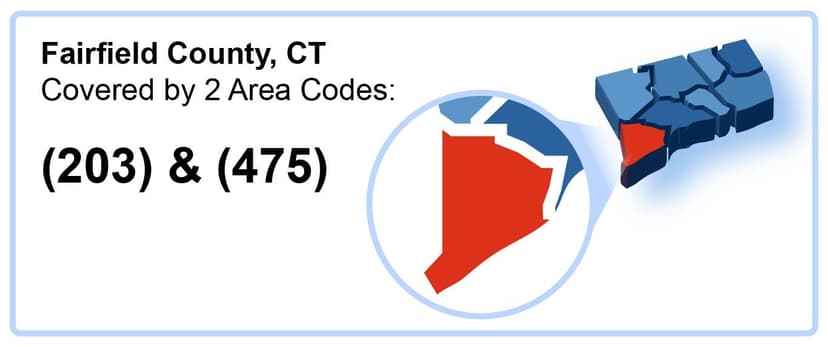What are Fairfield County Area Codes?

The switch to the North American Numbering Plan (NANP) created different Numbering Plan Areas (NPAs), with distinct numbering plan area codes allocated to each. The three digits at the beginning of North American telephone numbers represent the area codes. In Connecticut, area codes are under the Public Utilities Regulatory Authority (PURA)’s management, as delegated by the Federal Communications Commission (FCC).
The two area codes currently active in Fairfield County are:
Area Code 203
Area code 203, part of the original 86 area codes introduced in 1947, formerly served the entire State of Connecticut. Currently, it serves Fairfield County and the nearby counties. Fairfield County cities under the 203 NPA include Bridgeport, Stamford, Norwalk, Danbury, Stratford, Shelton, Trumbull, and Westport.
Area Code 475
Area code 475 is a Connecticut telephone overlay code in the NANP. It was introduced in 2009 as an overlay for the 203 NPA.
What are the Best Cell Phone Plans in Fairfield County?
Connecticut’s cellular coverage is excellent, with the four national carriers extending to almost every part of the state. AT&T has the most expansive reach and covers 99.9% of Connecticut. T-Mobile and Verizon are not far behind and offer 98% coverage of the state. Sprint’s coverage is also excellent, extending to 95% of Connecticut’s territory.
A 2018 CDC survey report showed that 40.8% of adults in Connecticut resided in homes with exclusive wireless phone subscriptions. About 50.6% of minors in the state also lived in households that relied exclusively on wireless phones. These figures indicate the shift away from landlines to wireless phones in Connecticut and Fairfield County.
VoIP (Voice over Internet Protocol) uses broadband internet connections to route phone calls. This distinguishing feature means that VoIP offers a wider range of phone services than traditional alternatives and at lower rates. VoIP phone services show rapid growth in the state and there are currently about 140 VoIP service providers in Connecticut.
What are Fairfield County Phone Scams?
Phone scammers use telephony services to extort money and fraudulently obtain personal information from Fairfield County residents. To deceive their targets into parting with their money or sensitive data, scammers call, text, or use robocalls to target and exploit their victims. The Department of Consumer Protection (DCP) in Connecticut identified common phone scams in the state. These include:
What are “You Just Won a Prize” Scams?
Scammers notify victims they have won lotteries or prizes in competitions they may or may not have entered. However, they require their victims to pay certain fees before claiming their prizes. The fraudsters may also try to obtain their victims’ personal and financial records by claiming they are required to receive their rewards. Note that you do not need to pay before collecting lottery winnings and competition prizes. Using a reverse phone lookup to identify anyone calling you with such claims and report this scam to the DCP by using their online complaint form.
What are Emergency Scams?
Scammers pretend to be friends or relatives of their victims when committing these scams. Usually, they late at night and pose as distressed loved ones requiring immediate financial assistance. In most incidences of these scams, elderly citizens are the targets, with scammers claiming to be grandchildren in need of help. Conducting a phone number lookup can help targets avoid this scam by providing an answer to the “who is this number registered to” question. Do not send money to the caller before confirming that the relative has a real need from a trusted third party. Residents can call (860) 713-6300 to report emergency scams to the DCP or file an online complaint.
What are Investment Scams?
Investment scammers extort money from Fairfield County residents by selling phony investments to victims. They call and introduce enticing investments, always with a fast-closing window of opportunity, to residents. The fraudsters will push their targets to make hasty decisions before thinking clearly about the offers presented. Check the Better Business Bureau (BBB) reviews for information to authenticate the reputation of companies offering investment opportunities. Ask as many questions as possible before investing. If you have fallen victim to investment scams, contact the DCP to file a complaint.
What are Utility Scams?
Scammers pretend to be utility companies’ employees and threaten to disconnect services if the victims do not make immediate payments for debts they supposedly owe. Even residents who do not owe for their services get targeted with these bogus demands. The criminals make suspicious payment demands by asking victims to pay by gift cards, preloaded debit cards, and wire transfers. Utility companies do not call residents and threaten immediate service disconnections, as this is illegal. Ignore such calls as they are from scammers. Use the DCP’s complaint form to lodge complaints if you have fallen victim to this scam.
What are IRS Scams?
IRS scams involve callers impersonating Internal Revenue Service (IRS) officials and threatening Fairfield County residents with arrest over unpaid taxes. The scammers also attempt to obtain the residents’ personal information. In these instances, they send random text messages, purportedly from the IRS. They ask residents to click on the links contained in the messages and update tax records. These links lead targets to cloned websites that harvest the personal information of unsuspecting residents.
The IRS does not initiate contact with defaulters over phone calls or text messages. Do not open links sent to update personal information. Contact the IRS directly via verified numbers to authenticate any claims or requests. Report IRS scams by sending an email to the IRS. Alternatively, submit reports of these scams to the DCP or the Federal Trade Commission.
What are Robocalls and Spam Calls?
Robocalls are phone calls made with automated dialers that deliver pre-recorded messages. Telemarketing firms use robocalls to contact multiple clients. Robocalls became worrisome when the numbers received by residents spiked, most likely due to scammers using them to target unsuspecting victims.
Relevant authorities have taken several measures to curtail the robocall menace. The Telephone Consumer Protection Act (TCPA) formulated strict guidelines for legitimate telemarketers when deploying robocalls. Phone manufacturers contribute to the fight against robocalls and spam calls by introducing call filtering and call blocking functions. Network operators also offer call-blocking services.
Follow these steps to reduce the number of robocalls received:
- Do not answer phone calls from unknown numbers. Let those calls go to your voicemail and return the ones that left valid messages.
- Set up your voicemail password to avoid infiltration through phone spoofing.
- End calls that turn out to be robocalls immediately. Do not push any button as may be instructed.
- Inquire about the most suitable call blocking tools from your network provider.
- Download third-party call blocking apps if your network provider does not offer an affordable one.
- Add your number to the National Do Not Call Registry. Registering on the list will notify legitimate telemarketers not to robocall you.
- Report to the FTC if robocalls persist after registering on the National Do Not Call Registry.
How to Spot and Report Fairfield County Phone Scams?
Phone scammers often use deceit and coercion to extort money and steal personal information from unsuspecting residents. Some tell-tale signs to look out for when determine whether a call from a stranger is a scam calls include:
- Prizes that you need to pay before receiving. There is usually no prize to be won and any money paid is lost.
- Calls from utility companies and tax authorities that threaten arrest over unpaid taxes or debts. Utility companies and the IRS do not initiate contact with defaulters by phone calls.
- Business opportunities that require immediate funding and afford you no time to research the proposals.
- Unsolicited calls, allegedly from government officials, seeking your personal information.
- Individuals or government agencies insisting that you make payments only through gift cards or money transfers are suspicious and likely scams. Gift cards or money transfers are hard to trace, and scammers prefer using them for this reason.
Efforts have been stepped up by government agencies to combat scams. These agencies make available resources on scams and they provide residents with platforms to report scam incidents.
Individual cities in Fairfield County have Police Departments that investigate scams and apprehend criminals. The Norwalk Police Department, for example, issues scam alerts to educate residents. Norwalk residents can report scams to the police department by dialing (203) 854-3000. Stamford Police Department also issues resources on scams to residents. Stamford residents are to report identity thefts and other frauds online or by dialing (203) 977-4444.
The Department of Consumer Protection (DCP) in Connecticut periodically updates residents on new scam methods. Victims should report scams online or by dialing (860) 713-6300. Additionally, residents can also send emails to report scams to the department.
The Federal Communications Commission (FCC) supervises the telecommunications industry. They provide resources that guide residents on how to identify spoofing and activate call blocking. To combat spoofing, the FCC has mandated network operators to step up caller authentication technology. Victims should report scams to the FCC.
The Federal Trade Commission (FTC) protects consumers’ interests. The FTC offers resources to help residents identify common phone scams and avoid robocalls. The FTC also manages the National Do Not Call Registry that warns legitimate telemarketers to avoid robocalling you. Dialing 1 (888) 382-1222 from the number intended to be on the list is another way for residents to get their number on the National Do Not Call Registry. Victims are to use the complaint assistance page of the FTC to file reports on scams.
